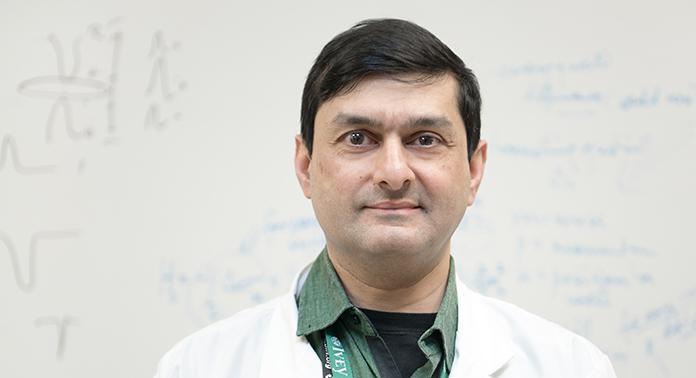Use of Kinematics in Movement Disorders: Measurement to Therapy
The Montreal Chapter of the IEEE Signal Processing (SP) Society cordially invites you to attend the following talk, to be given by Prof. Mandar S. Jog, Director of the National Parkinson Foundation Centre of Excellence in Parkinson Disease and Movement Disorders Program at London Health Sciences Centre and a Professor of Neurology at Western University, on Friday October 25th 2024, from 11h00am to 12h00am at Concordia University (EV Building, Room 3.309).
Date and Time
Location
Hosts
Registration
-
 Add Event to Calendar
Add Event to Calendar
- 1515 Saint-Catherine St. West
- Montreal, Quebec
- Canada H3G 1M8
- Building: EV-Building
- Room Number: 3.309
Speakers
Mandar S. Jog of London Health Sciences Centre, Western University
Use of Kinematics in Movement Disorders: Measurement to Therapy
The use of wearable sensor technology to enhance clinicians' ability to assess and treat movement disorders is reaching maturity. This talk will explore published work on how this technology is applied in the following areas:
- Use of gait measures to program a novel device for the treatment of Freezing of Gait (FOG): FOG is one of the most debilitating symptoms for some Parkinson's Disease (PD) patients. Most existing studies rely on a combination of subjective FOG measures and wireless kinematic systems during walking activities. In this talk, the use of spinal cord stimulation (SCS) and wearable motion sensors will be discussed, demonstrating how they allow for a more comprehensive assessment across both controlled and free walking tasks, providing more accurate inputs to program therapeutic devices for FOG treatment.
- Use of kinematic sensors on the arm to precisely assess tremor in Parkinson's Disease (PD) and Essential Tremor (ET): Botulinum toxin type A (BoNT-A) injections customized to each patient's unique tremor characteristics have shown superior efficacy and fewer side effects compared to the fixed-muscle-fixed-dose approach traditionally used in PD and ET tremor therapy. This talk will explain how a kinematic-based dosing method was developed to standardize and personalize BoNT-A injections, ensuring more effective tremor management.
- Use of kinematic sensors to assess cervical dystonia: BoNT-A injections are the first-line therapy for Cervical Dystonia (CD), but many patients discontinue treatment due to perceived insufficient relief. This presentation will outline how kinematic technology can enhance the assessment of neck motion, improve the selection of relevant muscles, and optimize BoNT-A dosing, ultimately improving therapeutic outcomes for CD patients.
- Using kinematics to guide injections of Botulinum toxin: Kinematics offers an objective method to help clinicians assess and determine the optimal parameters for BoNT-A injections to alleviate tremor in both PD and ET patients. This talk will illustrate how long-term kinematic optimization of BoNT-A therapy enhances the precision and effectiveness of the treatment, leading to better patient outcomes.
Biography:
Dr. Mandar S. Jog, MD, FRCPC, is the Director of the National Parkinson Foundation Centre of Excellence in Parkinson Disease and Movement Disorders Program at London Health Sciences Centre and a Professor of Neurology at Western University, both in London, Ontario, Canada. He also serves as one of the Associate Directors of the Lawson Health Research Institute.
Dr. Jog completed his Neurology training in Toronto and a fellowship in movement disorders with Dr. Anthony Lang. He then pursued a 4-year post-doctoral fellowship in Computational Neuroscience at the Massachusetts Institute of Technology (MIT) in Boston, Massachusetts, under Dr. Ann Graybiel, followed by a visiting professorship at the Stanford Research Institute (SRI Inc.) in California. In addition to his large clinical practice, Dr. Jog supervises many master's, PhD, and post-doctoral research and clinical fellows in his laboratory. He holds 8 patents and 4 provisional patents for innovative technology and is the co-founder of Medtrode Inc., as well as the founder of ManJog Enterprises Limited and MDDT Inc. His research aims to explore the structure and function of the basal ganglia and their role in movement disorders.
Dr. Jog has published over 350 papers and delivered more than 300 national and international presentations. His research focuses on: (i) Technology for the assessment and treatment of movement disorders; (ii) Speech; (iii) Gait, balance, and posture, as well as spinal cord stimulation; (iv) Animal models and electrophysiology of the basal ganglia; (v) Human intraoperative electrophysiological recording; and (vi) Computational and mathematical modeling of information processing in the brain. He travels internationally to conduct workshops and courses and is involved in numerous speaking engagements. Dr. Jog has also published two books, including one on the mathematical basis of information processing in the brain. Additionally, he participates in many national and international clinical trials for new treatments for movement disorders.
Dr. Jog has received several awards, including the Dean’s Award for Excellence in Research (2012), the Queens Diamond Jubilee Award (2013), the Faculty Scholar Award (2014), the President’s Award for Innovation (2014) from the London Health Sciences Centre, the Strategic Research Fund Award (2015) from the Lawson Health Research Institute, and the Lawson Innovation Award (2018).
Address:Canada


